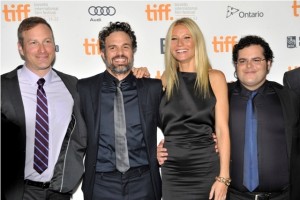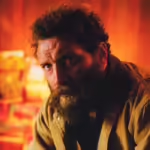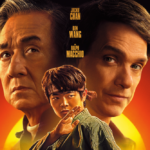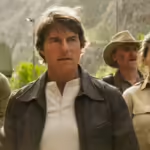TOM Magazine’s Brendan Dousi had a chat to Thanks For Sharing director Stuart Blumberg to find out the path to his directorial debut.
TOM: I was just wondering how you got started in film-making, I understand you started off as a screenwriter?
Stuart: Yes I did. I just always loved movies and tv and all of that stuff and I did a lot of it growing up with school and college. I was actually an investment banker right after college to make some money. I eventually quit and basically just sat in a room and started writing screenplays and television scripts and slowly went about figuring out how to do it.
TOM: An investment banker? That’s a bit of a change.
Blumberg: It was, it was. It was a high paying job where I could pay off my student loans and as soon as I did that I quit and I basically went after my passion which is trying to make movies and stuff like that.
TOM: Yeah, I read on IMDB that you got a BFA in History as well. What led from that into screenwriting?
Stuart: Well, you know, Film was my Major in college, but I’ve always loved history and I thought why not do that? You know, it was a liberal arts college where one degree is pretty much as worthless as the next, so I figured ‘this will be fun’ and could figure out what I could do with it later. It was good, it made me do a lot of reading and a lot of writing and helped with certain writing skills and, you know, I haven’t written any historical movies yet but maybe I will.
TOM: As I saw that I wondered if your dream was to write a historical epic like ‘Spartacus’. Would you ever be interested in writing something like that?
Stuart: I would love to. Actually one of the first scripts I wrote was about Mata Hari. She’s a fascinating story. I would love to, at some point, figure something out that actually happened instead of making it all up (laughs).
TOM: What would you say is your number one tip for anyone interested in screenwriting?
Stuart: I would say… I have a couple; watch a lot of movies, find out the kind of stories you want to tell (the things that come to you naturally) and read a lot of scripts from the movies that you love and try to figure out what makes them work and what gives their screenwriters their great voices. Then basically just start doing it and keep doing it until you get your own voice. Most of your first screenplays are going to be amateurish and horrible, but just keep going for as long as it takes (laughs).
TOM: How often would you say that projects you try to work on in Hollywood just completely fall through?
Stuart: I’d say, for me, more often than not. I’m batting around three-hundred right now. Which is good for me, but most people, the most exceptional people have told me that so many of their favourite projects never take off. It’s like, if a tree falls in a forest does it make a sound? So, if you write a script and it doesn’t get made, it’s sort of like “Wow, did that year of my life even happen”?
TOM: Would you say that it’s a job where a lot of your time gets wasted?
Stuart: Well, you can sort of look at it karmically and say there nothing really wasted, you learn from things in the process, but it’s definitely more fun when one of them gets made. Definitely, definitely.
TOM: Would you say that getting an Academy Award Nomination has helped you career-wise?
Stuart: Yeah, definitely. It obviously helped and probably made it a little easier to get me the chance to direct and things like that. I’m definitely pretty grateful the juice it kind of gets you, at least for a little while.
TOM: So, Thanks For Sharing is your feature directorial debut. What was your experience like transitioning from screenwriter to director?
Stuart: You know, I really enjoyed it. I produced a few of the movies that I had written so I had gotten the chance to sort of really be involved in the process of actually making the movies, so while that’s not the same as directing it definitely allowed me to watch directors at work, which made the process a lot smoother. But, I really enjoyed being actively involved in ever facet of the film-making process so for me it was a joy.
TOM: Was there anything in particular that made you want to try your hand at directing, have you had much interest in it in the past?
Stuart: Yeah, I’ve always really wanted to and I almost directed ten years ago another script I had, but it kind of fell apart twice and was kind of heart breaking. So, I sort of put that aside for a while and then after The Kids Are All Right came out and did well, I said “Ok, I think now I have another chance”. It’s always something I wanted to do. I’m not a complete introvert, so for me sitting in a room all the time is kind of painful, so I really relish the prospect of actually working with people who are not in my brain. So, for me it’s always been a dream.
TOM: There are quite a few big names in Thanks For Sharing, Gwyneth Paltrow and Mark Ruffalo to name a few, what was it like having such big names in your directorial debut? Did you ever find it intimidating?
Stuart: You know, it definitely was interesting and sometimes intimidating. I think the first few days are probably, you know, sort of intimidating, having to tell some of these Academy Award winners what to do. But, I felt like I had a good grasp of the story and I knew what I wanted to say and I knew what I wanted to show and that really helped. They were really great. They were really professional, they were there to really help carry the vision across. So, I’d say after a few days I forgot about who they were and I was just sort of killing it. It was great. They’re just people, you really see that quickly. They’re great at what they do but they’re people just like anyone else.
TOM: What would you say was your biggest challenge when making Thanks For Sharing?
Stuart: I’d say the biggest challenge was trying to make sure that the tone of the movie stayed within a certain bandwidth. I wanted there to be really great moments of comedy and I wanted there to be some really great dramatic moments and some kind of uncomfortable moments. The challenge was sort of knowing how far I could go while still making the tone coherent.
TOM: The film is about people dealing with addiction, in particular sex addiction, would you say it’s a personal topic for you? Do you have any personal experience with the topic?
Stuart: I have experience with people who’ve had all kinds of addiction; sex addiction, alcoholism, drug addiction. So, my way into it was sort of being involved with people who were going through addiction. I always found the twelve step programs that are used for recovery fascinating institutions. A lot of my work is about people creating their own community or family, and I found that a really interesting modern kind of phenomenon, twelve step groups, so that’s sort of why I got into it. I chose sex addiction because I was starting the idea when all of these very high profile people in the press were coming out with all these scandals and there was a lot of talk about it, like, “was it real or isn’t it?” and I thought that’s a fascinating question to explore, “Is it or isn’t it?”. There’s a lot of scepticism, but the more you research it the more you see exactly how real it is, like other addictions, and how life destructive it can be. So, I thought it was an addiction that hadn’t been played out so much that was very dramatic and very interesting because we all are sexual creatures and I thought that would be a very cool topic that’s well worth exploring.
TOM: You mentioned you did some research, what kind of research did you do for the film?
Stuart: I did a lot of reading and I went to a lot of meetings and talked to people in the programs and tried to get a sense of their stories.
TOM: What would you say is a part of the film that resonates with you most personally, is there one part in particular?
Stuart: You know, there are a bunch of parts and I think I… the Josh Gad character dealing with food, sex an all that stuff. I’ve had my own food stuff as well, but I think the thing that I found actually most resonating with my own problems and my own life is feeling that… you know, you try to solve your problems alone oftentimes and just fall short. At the times I’ve been most able to really make change was when I was with a support system. The thing I found most resonate in this, that I really think twelve-step are interesting to show, is that it’s not like somebody who’s ‘fixed’ is helping somebody who’s ‘broken’. It’s flawed people helping other flawed people and to me, that’s the thing that resonated the most.
TOM: One of the characters in the film goes off the rails for a bit, and for a while there the film gets surprisingly dark. It felt like this tonal shift was important to the film, what was the decision behind this?
Stuart: It’s interesting, because, while I haven’t seen Shame it’s my understanding that it does stay in a very dark place for most of it. I wanted to show what going down the rabbit hole looked like. That was important to show sort of what that is, but I didn’t want to show it right at the beginning, I felt that in a certain way I might lose the audience. So, I purposefully wanted to bring the audience in and get you comfortable with the characters and actually get you to like the characters so that when they go off the rails you go with them.
TOM: Finally, I’ve just got to ask. There’s a dinner party scene at the beginning of the movie where Gwyneth Paltrow and Mark Ruffalo’s characters are eating insects. Did you eat any of those bugs, maybe out of solidarity?
Stuart: You know, would you believe there’s a little movie magic with the bugs…
TOM: Oh, no!
Stuart: I mean, there were real bugs there but the ones we made the actors eat weren’t real bugs.
TOM: Shame! Well, that’s all we’ve got time for, thanks for chatting with us today, Stuart.
Stuart: Thank you very much.




